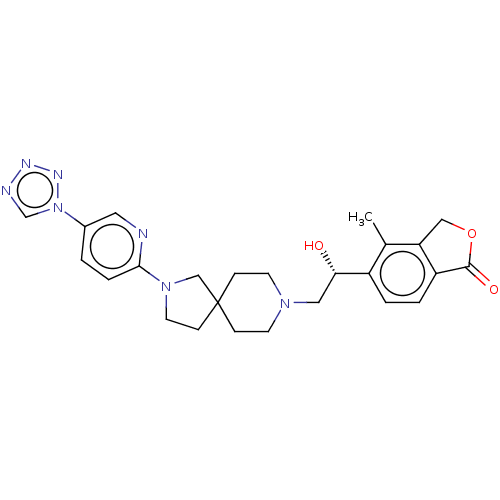

 Search and Browse
Search and Browse
 Download
Download
 Enter Data
Enter Data
| Target/Host (Institution) | Ligand | Target/Host Links | Ligand Links | Trg + Lig Links | Ki nM | ΔG° kJ/mole | IC50 nM | Kd nM | EC50/IC50 nM | koff s-1 | kon M-1s-1 | pH | Temp °C |
|---|---|---|---|---|---|---|---|---|---|---|---|---|---|
| ATP-sensitive inward rectifier potassium channel 1 (Homo sapiens (Human)) | BDBM338476 (US9751881, Example 8) | Reactome pathway KEGG UniProtKB/SwissProt DrugBank antibodypedia GoogleScholar AffyNet | PC cid PC sid UniChem | Article PubMed | n/a | n/a | 37 | n/a | n/a | n/a | n/a | n/a | n/a |
Merck& Co. Curated by ChEMBL | Assay Description Inhibition of human ROMK channel expressed in HEK293 cells after 30 mins by FLIPR based thallium flux assay | Bioorg Med Chem Lett 27: 2559-2566 (2017) Article DOI: 10.1016/j.bmcl.2017.03.086 BindingDB Entry DOI: 10.7270/Q2BV7K1G | |||||||||||
| More data for this Ligand-Target Pair | |||||||||||||
| ATP-sensitive inward rectifier potassium channel 1 (Homo sapiens (Human)) | BDBM338476 (US9751881, Example 8) | Reactome pathway KEGG UniProtKB/SwissProt DrugBank antibodypedia GoogleScholar AffyNet | PC cid PC sid UniChem | US Patent | n/a | n/a | 37 | n/a | n/a | n/a | n/a | n/a | n/a |
Merck Sharp & Dohme Corp. US Patent | Assay Description Assay Protocol: The ROMK channel functional thallium flux assay was performed in 384 wells, using the FLIPR-Tetra instrument. HEK-hKir1.1 cells were ... | US Patent US9751881 (2017) BindingDB Entry DOI: 10.7270/Q26M38ZP | |||||||||||
| More data for this Ligand-Target Pair | |||||||||||||